Machiavelli in Egypt .. and Tunisia, Yemen, Jordan (and would you believe .. Canada too?)
Feb 5th, 2011 | By Counterweights Editors | Category: In Brief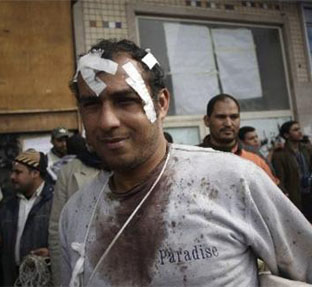
A wounded anti-government protestor at Tahrir Square, Cairo on Friday: a man who is not giving up or giving in. Sebastian Scheiner/AP.
[UPDATED FEBRUARY 7, 23]. It is of course very difficult to know just what is going on in Egypt – or the Middle East at large – right now. Some three and a half years ago, however, our resident Ontario historian, Randall White, was contemplating the question “Machiavelli .. is he the prince of darkness who haunts democracy in America 2007? ” And on February 4, 2011 it was tempting to wonder just what the 16th century “founder of the modern tough-minded science of politics, direct from the school of hard knocks” might have to do with the events on Tahrir Square in Cairo.
Machiavelli was a great supporter of “citizen armies” in the struggles of the Italian city states of his day (as opposed to the mercenary forces so often employed). And he spent an important part of his civil-service career promoting the development of just such a force in his native city state of Florence. But the kind of sudden and (at least initially) surprisingly effective “street revolt” that we have seen in Tunisia, Egypt, Yemen, and Jordan over the past several weeks was not exactly within the experience of the Italian town-and-country-side of 500 years ago.
Here it seems more apt that the 20th century American community organizer Saul Alinsky (an influence of sorts on Barack Obama and Hillary Clinton) wrote, apropos of both his own and Machiavelli’s most famous books: “The Prince was written by Machiavelli for the haves on how to hold power. Rules for Radicals is written for the have-nots on how to take it away.”
It is similarly intriguing that Alinsky also wrote with some enthusiasm about Mahatma Gandhi’s concept of “passive resistance,” as “the only intelligent, realistic, expedient program which Gandhi had at his disposal.” And there are echoes that seem relevant for the most troubling questions about current events in Egypt, in Alinsky’s stress on how “the kind of means selected and how they can be used is significantly dependent upon the face of the enemy.” Gandhi’s “enemy was a British administration characterized by an old, aristocratic, liberal tradition, one which granted a good deal of freedom to its colonials … the kind of opposition that would have tolerated and ultimately capitulated before the tactic of passive resistance.” [FOR FEBRUARY 7 and 23 UPDATES CLICK ON “Read the rest of this page” AND/OR SCROLL TO BOTTOM OF PAGE.]
* * * *
[IF YOU ARE READING THIS ON OR AFTER FEBRUARY 23, 3011, YOU MAY WANT TO IMMEDIATELY SCROLL DOWN TO THE FEBRUARY 23 UPDATE BELOW.] How will the kind of unarmed mass protest that both Gandhi and Alinsky worked so hard at developing as a source of have-not political power fare, in the face of the resolute and decidedly un-liberal use of armed force by governing establishments that marked the tragic story of the Tiananmen Square protests of 1989? The Tiananmen experience itself answered that question (not unlike the abortive Hungarian Revolution of 1956 and the repressed Prague Spring of 1968). And there are those who have feared that today might finally see something all too similar unfold on some fresh-bloodied pavement of Tahrir Square in Cairo.

Anti-government demonstrators are watched by army soldiers from behind barbed wire as they line up to get into Tahrir Square, Cairo, on Friday. Peter Macdiarmid/Getty Images.
Yet as we write, the New York Times has reported that: “After signs of a looming crackdown Thursday, Mr. Mubarak’s forces appeared to pull back Friday, and on the 11th day … the atmosphere in Tahrir Square reverted from embattled to jubilant once again. Protesters have remained in uncontested control of the square since about 5:00 a.m. Thursday, when they won a 14-hour war of stones and Molotov cocktails against gangs of Mubarak loyalists … On Friday they abandoned their makeshift barriers to chant, pray and sing the national anthem around the center of the square, where newcomers carried in bags of bread and water. Tens of thousands of others demonstrated in Alexandria and Suez.”
Who knows where it will all end, of course again? But February 4, 2011 in the ancient Land of the Pharaohs may have given a little more hope to a world that needs any hope it can get.
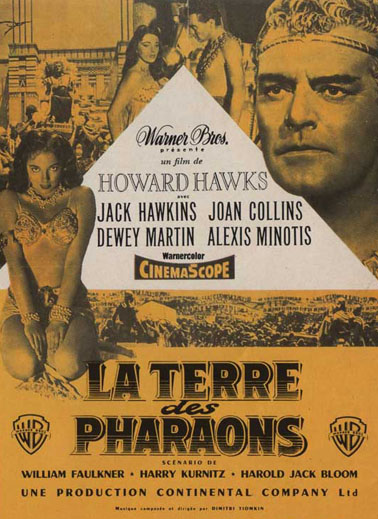
William Faulkner had a hand in writing the screenplay for Howard Hawks’s 1955 Hollywood classic (of sorts), Land of the Pharaohs / aka La Terre des Pharaons, starring Jack Hawkins and Joan Collins. Very few people in Egypt were impressed, no doubt, then or now.
Patrick Martin of the Toronto Globe and Mail, reporting from Cairo, no doubt wisely enough points out: “There was a clear winner in the battle for Egypt this week, but it was neither President Hosni Mubarak nor the Tahrir Square protesters. It was Egypt’s army … There may be doubts about how long Mr. Mubarak can hold on, or about the continued energy of the protesters, but there are no doubts about who really rules this country – who has always ruled it since 1952 – and who will continue to rule it far into the future: the military … On Friday [February 4], for example, the week ended on a relatively peaceful note, for which the 200,000 people who staged an all-day political protest on Tahrir Square can thank the Egyptian Army. It established a hard perimeter around the square that kept out the kind of violent pro-Mubarak demonstrators that attacked them Wednesday and Thursday.”
The fate of Egypt nonetheless rests in the hands of Egyptians – and the army could (in principle at any rate) organize proper democratic elections to succeed Mubarak, and then take a few steps back. (We can dream, can’t we? Someone ought to be dreaming nowadays.)

Anti-government protesters in Alexandria, Egypt’s second-largest city, on Friday, February 4. AFP/Getty Images.
Meanwhile: “Greek prime minister George Papandreou is to visit Egypt on Sunday to deliver a message from the EU to President Mubarak face to face.” (Shades of Cleopatra, some will say?) And then: “US in talks to ease out Mubarak as Cairo spills over” ; “Egypt has Obama cautiously shifting world view on democracy” ; and “Is the White House using Congress to send tough messages to Mubarak?”
Machiavelli, some will urge, would just be on the side of the Egyptian army’s finally using brute force to reinstall some new kind of essentially military dictatorship, disguised as a new (and perhaps more explicitly “Islamic”) presidential republic, and so forth. But there is another “liberal republican” Machiavelli, others might argue, who would finally come down on the side of the unarmed mass protestors on Tahrir Square – as a kind of high-technological 21st century incarnation of his citizen army concept. In either case he would almost certainly want to remind everyone involved that the “crucial human activity of politics is in its nature a very tricky and even dirty business; if you get involved in it without developing some tricky and dirty skills yourself you will be eaten alive.”

Statue of Niccolo Machiavelli in the outdoor arcade at the Uffizi museum, Florence, Italy, today. Crashworks’ photostream.
And meanwhile again, this past Tuesday Lawrence Martin at the Globe and Mail (no family relation to the aforementioned Patrick Martin at the same newspaper, as far as we know) was aptly enough noting that the “tumult in Tunisia and Egypt brings to mind … the weakened state of Canadian democracy and whether we’re prepared to do anything about it.” Whatever else, the unarmed mass protestors on Tahrir Square in Cairo are showing that, at this moment, they have more raw political courage and real democratic spirit than virtually all of us who live in such a more fortunate “free and democratic society” as Canada – which could also stand some increasingly serious brand of democratic reform. And, the longer they can keep it up, the more it will strengthen their position in the global village of the future. In more than a few ways, no doubt, we could learn as many lessons from them as they could learn from us.
UPDATE FEBRUARY 23: As suggested by the comment below from Ken at the “Buckeye Firearms Association … Defending Your Firearm Rights” (a group in Ohio apparently), there have been various intriguing plot thickenings in what some are calling “the Arab Awakening” since we last reported on February 5 and 7.
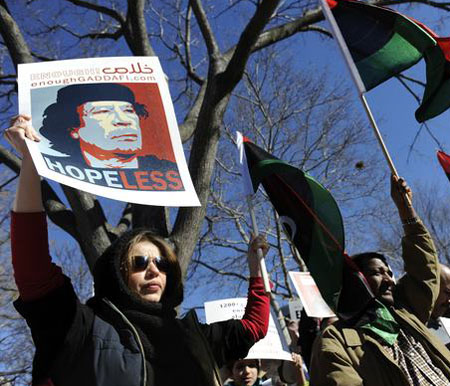
Protesters demonstrate against rule of Libya’s Muammar el-Qaddafi in front of White House in Washington.
Like so many others, we think current events in the Middle East are among the most interesting and potentially constructive things that have happened in the recent history of the global village. At the same time, we continue to believe that it is “very difficult to know just what is going on in Egypt – or even the Middle East at large – right now.”
For one cut at the latest news, as of February 23, 2011, see: “Qaddafi Grips Capital While Rebels Gain Across Libya/Mercenaries Stream Toward Tripoli as Qaddafi Digs In” ; “Bahrain King in Saudi Arabia to Discuss Unrest” ; “Promoting Democracy is not Imposing Democracy”; “How to win a Nobel Peace Prize: Egypt, Tunisia and beyond”; “Tunisia walks fine line with Islamist revival”; “Thousands protest against interim government in Tunisia”; “US ‘monitors’ Tunisia power transition”; and “Challenges Facing Countries Across North Africa and the Middle East.”
As matters stand, Tunisia and Egypt are the two places where what the Turkish analyst Dogu Ergil has called “The fourth wave of democratization” has (hopefully) set in with some prospect of success. Both places have now completed his first stage of “Transfer of authority from the old power elite to an interim decision-making body.” And this interim body in both cases is (hopefully again) supposed to be organizing credible elections for a freshly constituted democratic political system in the near future. For the moment, as Ergil has also nicely explained: “we can only say that the door to democratization is opened, but there is a long road ahead and the roadmap is not yet at hand. It is currently being drawn up.”
In Egypt, eg, it remains the case that, as Patrick Martin at the Toronto Globe and Mail urged a few weeks ago: “There was a clear winner in the battle for Egypt … but it was neither President Hosni Mubarak nor the Tahrir Square protesters. It was Egypt’s army.”
Our own supplementary conclusion of this past February 5, however, seems, if anything, a little more likely than it did then: “The fate of Egypt nonetheless rests in the hands of Egyptians – and the army could (in principle at any rate) organize proper democratic elections to succeed Mubarak, and then take a few steps back. (We can dream, can’t we? Someone ought to be dreaming nowadays.)” We continue to dream ourselves – as realistically as we can.
* * * *
As for the specific remarks on how Niccolo Machiavelli (1469—1527) relates to all this, from Ken at the Buckeye Firearms Association (again see his comment below), we should begin by pointing out that at least half the several individuals involved in our February 5 posting have been reading and re-reading Machiavelli for decades – and not just The Prince and The Discourses, but also, eg, his comic play Mandragola and his History of Florence.
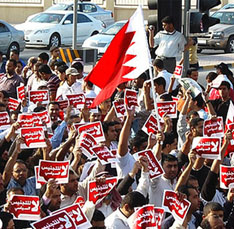
Thousands of Shia Muslims demonstrating in Manama against the Bahraini government. Photo: Zizou scorpion.
The key point our long study of Machiavelli has made clear to us is that – as urged in our original commentary – “the kind of sudden and (at least initially) surprisingly effective ‘street revolt’ that we have seen in Tunisia, Egypt, Yemen, and Jordan over the past several weeks was not exactly within the experience of the Italian town-and-country-side of 500 years ago.”
(And this would apply as well of course to such more recent events in such places as Algeria, Bahrain, Iran, and Libya too, allowing that as yet only the street revolts in Tunisia and Egypt can be counted as altogether surprisingly effective, although Libya does seem on the verge of something similar as we write here, despite Qaddafi’s digging in in Tripoli?)
Insofar as some “What would Machiavelli think if he were alive today” does nonetheless make some sense, as a kind of helpful current entertainment, we would see the point Ken at the Buckeye Firearms Association is trying to make as fundamentally the same as our February 5 argument that “there is another ‘liberal republican’ Machiavelli, others might argue, who would finally come down on the side of the unarmed mass protesters on Tahrir Square – as a kind of high-technological 21st century incarnation of his citizen army concept.”
The one thing unambiguously clear to us is that “viewing Eygpt, Lybia, Tunisia etc, Nicollo would” NOT “without hesitation, say that the Princes should have chosen to be loved, since they could not even begin to implement the fear caveats.” [And btw, his first name is usually spelled “Niccolo” in English, or even “Niccolò,” not “ Nicollo,” as Ken writes – though there does seem some slight room for debate about spelling here.]
Even the mere ghost of Niccolo today would be much too smart to proffer such jejune advice as “you should have chosen to be loved” to the likes of Hosni Mubarak, Muammar el-Qaddafi, and Zine al-Abidine Ben Ali in 2011. In theory, perhaps, there may have been a time in the more distant past when these authoritarian rulers could have at least tried to choose to be loved. (Although to us a deeper understanding of Machiavelli’s message would be that the choice between fear and love is not exactly an either-or proposition.) But at that time they in fact chose to be feared, because in those days they could realistically make that choice (or “implement the fear caveats,” as Ken puts it): that’s why they became authoritarian rulers in the first place.
The interesting question for us today is why the politics of fear finally gave out – in Tunisia and Egypt at least, so far – when it did, in 2011: not whether Mubarak, Qaddafi, and Ben Ali actually could have or would have chosen to be loved many moons ago. No successful adviser to princes commands respect by giving advice about what should have been done in some distant past, as opposed to what must be done right now. (And Machiavelli was in fact, for a time, a successful adviser to princes: that is one key part of his writing that makes it so interesting, even today.)
Our reciprocal apologies to Ken and his Ohio rifles in any case. But our thanks as well. Debate is the lifeblood of democracy, and even a mistaken argument can sometimes advance the debate!
UPDATE FEBRUARY 7: By late this past weekend there seems to have been some movement towards some kind of compromise resolution of the current impasse in Egypt. See, eg:
“Opposition, Mubarak regime to draft ‘road map’ for landmark talks … The Egyptian regime of Hosni Mubarak has taken a giant step toward the goals of the country’s opposition … The meetings Sunday between Vice-President Omar Suleiman and representatives of several opposition parties were unprecedented in nature …”
“Egyptian opposition softens demand for Mubarak’s immediate exit … The main Egyptian opposition groups eased up on their insistence that President Hosni Mubarak step down immediately, agreeing instead on Sunday to join in talks toward overhauling the country’s political system at a more gradual pace while Mubarak remains in office. “
Just how durable or extensive – or widely supported – this kind of compromise resolution will prove to be of course remains quite unclear. (And the same goes for just what its specific content is likely to be – and the relative weight of religious and secular impulses among the participating “main … opposition groups.”) For the moment, we would agree, it does nonetheless seem impressive that something of this sort seems to be happening.
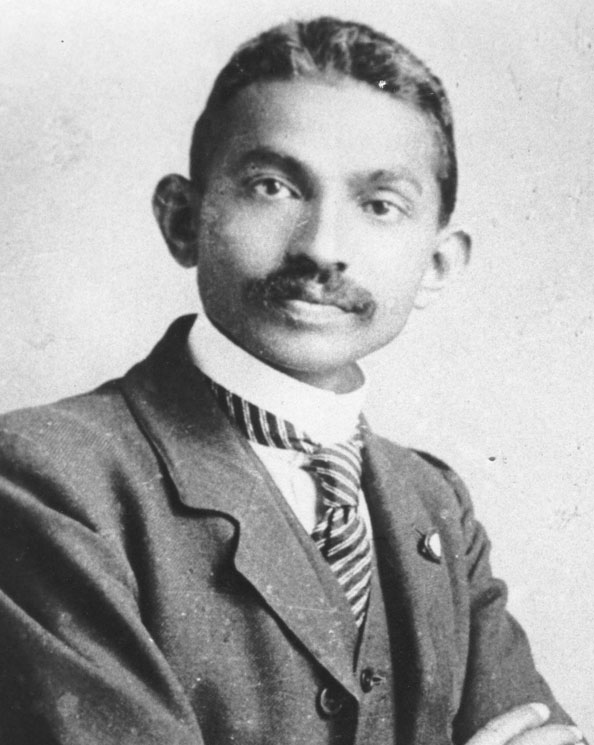
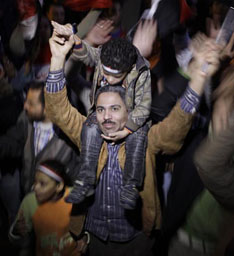



I’m sorry, but I think you have a fundamental application problem here. You are showing some tentative grasp of Machiavelli, but mis-applying the understanding.
The Eygyptian army could be the militia or it could be the mercenary army warned against. Turned out they were the militia. In Lybia, it appears they are the mercenaries.
Also, the “better to be feared than loved” refrain is from the more cursory Prince rather than the more detailed Discourses. There were a bunch of caveats to the “feared” plank of his argument, all of which we see failing in Eygpt. Mubarak cannot eliminate the ability of those in fear to retaliate. Mubarak cannot refrain from causing harm to their women and property. Mubarak cannot recompense the daily wrongs inflicted on those in fear. Mubarak took the entire “feared” approach and did every single thing wrong, warned against by Machiavelli.
Sorry, but viewing Eygpt, Lybia, Tunisia etc, Nicollo, would, without hesitation, say that the Princes should have chosen to be loved, since they could not even begin to implement the fear caveats. Quadaffi tried to implement the fear approach more than any others, and as I write this he has control of less than half his country.